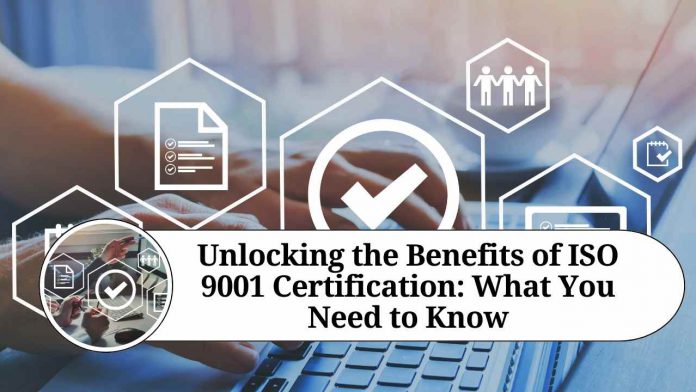ISO 9001 is a globally recognized quality management system standard that provides a framework for organizations to establish and maintain an effective quality management system. The standard was first published in 1987 and has since been revised multiple times, with the latest version being ISO 9001:2015. In this blog, we will discuss what ISO 9001 certification is and its benefits.
What is ISO 9001 Certification?
ISO 9001 certification is a third-party verification process where an independent certification body assesses an organization’s quality management system to ensure that it meets the requirements of ISO 9001. The certification process involves a series of audits and evaluations to determine if the organization has implemented the necessary processes and procedures to meet the ISO 9001 standard.
The certification process typically involves the following steps:
- Pre-assessment: The certification body will conduct an initial review of the organization’s quality management system to identify any areas that need improvement.
- Stage 1 Audit: The certification body will conduct a documentation review to ensure that the organization’s quality management system is compliant with the ISO 9001 standard.
- Stage 2 Audit: The certification body will conduct an on-site audit to evaluate the organization’s implementation of its quality management system and identify any areas that need improvement.
- Certification Decision: Based on the results of the Stage 2 Audit, the certification body will decide whether or not to award ISO 9001 certification.
- Surveillance Audits: The certification body will conduct regular audits to ensure that the organization continues to meet the ISO 9001 standard.
What are the Benefits of ISO 9001 Certification?
- Increased Customer Satisfaction: ISO 9001 certification demonstrates that an organization is committed to providing high-quality products and services. This can lead to increased customer satisfaction, which can result in increased customer loyalty and repeat business.
- Improved Processes: ISO 9001 certification requires organizations to implement a systematic approach to quality management. This can lead to improved processes, increased efficiency, and reduced costs.
- Competitive Advantage: ISO 9001 certification is recognized globally and can provide organizations with a competitive advantage. It can demonstrate to customers and stakeholders that the organization is committed to quality and has implemented effective quality management systems.
- Better Decision Making: ISO 9001 certification requires organizations to use data to make informed decisions. This can lead to better decision making and improved business performance.
- Increased Credibility: ISO 9001 certification is a globally recognized standard and can provide organizations with increased credibility. It can demonstrate to customers, stakeholders, and regulators that the organization is committed to quality and has implemented effective quality management systems.
Conclusion
ISO 9001 certification is a valuable tool for organizations looking to improve their quality management systems. It provides a framework for organizations to implement effective quality management systems and can lead to increased customer satisfaction, improved processes, competitive advantage, better decision making, and increased credibility. If your organization is looking to improve its quality management systems, ISO 9001 certification is a worthwhile investment
Other Related Blogs: Section 144B Income Tax Act
Frequently Asked Questions (FAQs)
Q. What is ISO 9001?
ISO 9001 is a globally recognized standard for quality management systems. It provides a framework for organizations to establish and maintain an effective quality management system that meets the needs of its customers and other stakeholders.
Q. What is ISO 9001 certification?
ISO 9001 certification is a process where an independent third-party certification body verifies that an organization’s quality management system meets the requirements of the ISO 9001 standard.
Q. Why should an organization get ISO 9001 certified?
ISO 9001 certification provides several benefits to an organization, including increased customer satisfaction, improved processes, competitive advantage, better decision making, and increased credibility.
Q. Who can get ISO 9001 certified?
Any organization, regardless of size or industry, can get ISO 9001 certified. The standard is applicable to all types of organizations, including manufacturing, service providers, government agencies, and non-profit organizations.
Q. How long does it take to get ISO 9001 certified?
The time it takes to get ISO 9001 certified varies depending on the size and complexity of the organization’s quality management system. Typically, the certification process can take several months to a year to complete.
Q. What is involved in the ISO 9001 certification process?
The ISO 9001 certification process involves a series of audits and evaluations to determine if the organization has implemented the necessary processes and procedures to meet the ISO 9001 standard. The certification process typically involves a pre-assessment, stage 1 audit, stage 2 audit, certification decision, and surveillance audits.
Q. How long is ISO 9001 certification valid?
ISO 9001 certification is valid for three years. During this time, the certification body will conduct regular surveillance audits to ensure that the organization continues to meet the ISO 9001 standard. After three years, the organization will need to undergo a recertification audit to maintain its certification.
Q. Can an organization lose its ISO 9001 certification?
Yes, an organization can lose its ISO 9001 certification if it fails to maintain its quality management system to the required standard. The certification body may conduct a re-audit or withdraw the certification if the organization is found to be non-compliant with the ISO 9001 standard.
Q. Is ISO 9001 the only quality management system standard?
No, there are several other quality management system standards, including ISO 14001 (environmental management), ISO 45001 (occupational health and safety management), and ISO 27001 (information security management).




















